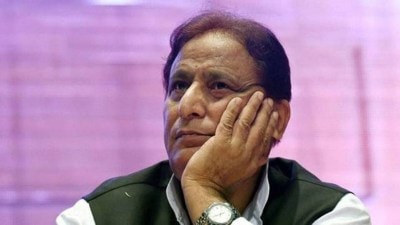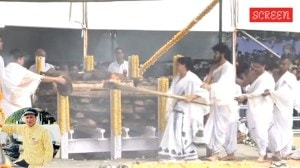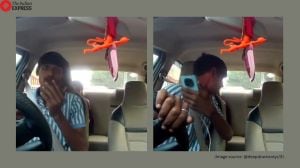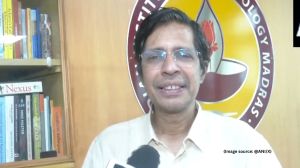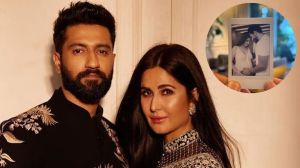‘Corporate planning is now done in the corp, not in Udyog Bhavan or Shashtri Bhavan. That’s a change’
• This is a very unusual location. About 90 km off the coast of Andhra Pradesh, some 55 nautical miles, on board Discoverer 534, a dril...

• This is a very unusual location. About 90 km off the coast of Andhra Pradesh, some 55 nautical miles, on board Discoverer 534, a drilling ship, which can find oil, gas… I believe this is the largest gas find in the world last year?
We started our programme here in 2002. That year we announced the gas discovery, the largest in the world in 2002. We are right now on Discoverer 534, drilling well number 10, and we have been extremely lucky that all the programmes that we have had so far have been successful. Each of these wells are called Dhirubhai 1, 2, 3… after my father who was a visionary, the real driving force to make us move into the upstream area.
• Your father was not a geologist, but he used to say things like ‘I can’t believe God could be so unkind to India as not to have given it any hydrocarbon’.
Absolutely, he was of the firm belief that the only reasons why India made no progress in the hydrocarbon and energy front were: one, people didn’t have the risk-taking ability to put risk capital into work; two, God has been extremely kind to the entire region around us — Bangladesh, Middle East… you have hydrocarbon all around the region, so India should also be a hydrocarbon-based economy.
• When did your entry into exploration begin?
We started our work in 2001-02…
• Tell me some of the self-doubts that came in… nobody had explored in this area before that, but geological evidence was there…
No new company suddenly starts drilling at 6000 ft. People take the more cautious approach, they begin at lower depths, onshore etc before they go and move into…
• Tell me, in the language of a layman, when you mean really deep how does it compare with Bombay High…
This is 6000 ft. And we are talking about medium depths of all the other works in India. This is truly world-class.
• How does it compare with Bombay High in sheer technological challenge and depth?
Bombay High has been challenging, but that was many, many years ago. A lot of time has elapsed, technology has really progressed…our real challenge from new technology developments. We do it on our own, we don’t have an international partner.
• But Bombay High is not as deep as this?
No.
• A third or…
Maybe even less.
• So what kind of advice did you get? Did people say it is never going to be possible to find anything here?
The first time we spoke about doing something like this, we went out to all major companies, and all of them said, ‘look, India has no hydrocarbon potential, why are you wasting your money’. And they refused to give us technology. Fortunately, we didn’t need their capital. So we said we will hire the best intellectual capital that exists, develop their skills and do it on our own. We have got the risk capital which we will put to work.
• This particular rig, I believe, has been very lucky.
This rig has been very lucky for us and the whole gas industry in India. This is the largest discovery of gas in the world.
• Tell me the circumstances when you realised that your faith was justified, that there is hydrocarbon here…
I think it was the faith of my father that was justified. It happened very funnily. In May 2002, we had taken Papa for an annual health check-up to a Cleveland clinic. I got a call at 4:30 in the morning, in my hotel room from his room: ‘What are you doing?’ he said. I replied: ‘Saade char baje kya kar raha hoon? So raha hoon (What am I doing at 4:30 am? I am sleeping).’’ He said: ‘Abhi mere room mein aa jao (Come to my room now)’’. So I asked if everything was okay, healthwise? He said all was fine, but there was something important to communicate to me.
So I went to his room, he was sitting here. I looked at him and said ‘okay, what is it, I have come here’. He said: ‘Anil, today is a very important day for India.’ I was wondering whether a major Indo-Pak pact had happened or something major. I asked what was it that had happened that was so great for the country. He said he had just finished a call from our chief geologist a few minutes ago, and had been informed that we had struck gas in our very first well that we drilled. His only comment was, ‘Today is a great day for the country. And we are going to be an economic superpower, an energy superpower in the future.’
• Have you ever thought of the geo-political implications of these energy finds? We have Bangladesh and Myanmar sitting on sizeable reserves. We have got Iran wanting to pump them into India through Pakistan. What will it do to the geopolitical scene three years from now?
The first reaction we got after we announced this discovery in October 2002 was: what is going to happen to the reserves in Bangladesh? Ultimately, the billion-plus people in India, the Indian industry is the largest consumer of this gas. For Bangladesh, they want to ship this gas to India, Iran wants to ship it to India. From a geo-political standpoint, India is going to be a force to reckon with in the energy front, and India is going to be an economic superpower in the years to come.
• Do you see, in 10-15 years, a huge Asian gas grid with pipes going to Korea, Japan from India?
The consumption in India is so vast, our needs are so vast, I think in the next 15-20 years we will be pre-occupied with developing consumption in the country. There is so much of a shortage, thirst.
• The business you are in — exploration, refining — the main competition is still government. So where will the competitive urge come from?
The oil and gas industry is a global one. I think ONGC and GAIL have done outstanding work, and the challenges are so vast that we need far more number of players. This is a global business, companies will have to go where the natural resources exist, there are no geographical boundaries saying this is outside India, this is inside India… we have exploration property in Aden, Yemen where again we have discovered oil…
• In fact, your father started off in Yemen.
My father started out as a petrol pump attendant in Aden…
• A modest petrol pump attendant. And for you now to be exploring for hydrocarbon in Yemen…
It is a good feeling, apart from the economic sense it makes, because these are the natural resources that exist.
• Your brother Mukesh always says, you need scale, scale up. When you go out to make scale, do you still see areas in India — in terms of regulatory mechanism, government control — where you would like loosening up for you to be able to grow?
We have been in the process of building Reliance for the last 25 years, and if I look at the pre-1991 era — I would call it the pre-Manmohan Singh era — and where we are today, it is chalk and cheese. However, in a large number of areas, we still have to do tremendous work in going forward and trying to create an environment of the freedom to operate.
• Give some specifics…
Let’s say, for example, environment approvals. They have the longest time delays. We are not here to damage the environment in any fashion, but this can delay programmes by one or two years.
• I believe you are struggling with a turtle-breeding area problem…
That is in Orissa, but if I leave that aside, what is the economic value if you delay programmes by two years? A one-year delay would mean hundreds of crores. Don’t forget that everything that we do in oil and gas, there is a large revenue for the Government of India. Just to give you an idea, if I made a net present value of the entire income stream from just this place, the Government of India would get over Rs 10,000 crore in royalty and cess. And every year delay is an opportunity lost.
• Over 10-15 year period?
No, I am talking about if I make the net present value today, I can give a cheque of Rs 10,000 crore.
• Of course many would say Reliance doesn’t have to bother with regulatory approvals anyway because you make your own rules…
That’s not true at all. Being a world-class company, a world-class operator, there are 150 people aboard the ship, they are of international calibre. They will want to see that all rules and regulations are followed and there are no cutting corners.
• Including the environmental ones…
Including every approval that is required, including safety. We are wearing safety helmets, I am wearing safety glasses, these are things I can say I don’t want to do. But there are no short-cuts.
• You look at the picture 10-15 years ahead… The House of Tatas have seen a lot of internal reforms, restructuring. Where do you see the need to restructure your empire, Reliance? Because you moved in from old economy environment to new economy…
These definitions are good for analysts, people trying to rationalise buying and selling companies. If you look at the top 20 companies of the world, 19 of them are still brick-and-mortar companies. I have nothing against tech companies. What I am saying is that if you have a car manufacturer or an oil and gas manufacturer, you won’t get the supply over the Net. There is a physical delivery.
When it comes to what we need to do at Reliance moving forward in terms of reforms, we are extremely lucky that this is a first-generation enterprise. This is a 25-year-young company. We don’t have too many businesses that we have to think of reorganising or restructuring. I will give one example. In 1978, 100 per cent of our business was in the downstream textile fabric business. In 2004, it is going to be under half. It is still the largest textile brand, it’s got Rs 800 crore sale. But still, it doesn’t affect our overall portfolio significantly.
I think the future for us is two-pronged: energy related areas and service-related areas. Even when we look at the distribution of power, which is a utility business, it falls into the services domain. Fifty per cent plus of our GDP is coming from services, and we need to have our footprint in that. But clearly harnessing what we think we can do best… So you speak of worldscale, economies of scale, being globally competitive, financial engineering…well, these are all the skill sets that Reliance possesses.
• Let me ask you a couple of questions that I asked your brother, and let’s see how you measure up: the first one that I will ask any Ambani is, do you now have to deal with the government as much as you did in your father’s time? The answer will obviously be no. But how is the government still crucial? And do you still have to arm-twist the government or do you feel arm-twisted by the government?
I think arm-twisting is a mutually reciprocal arrangement, people will have to do different things for different purposes… but that’s on a lighter note. I think government interference in business has come down dramatically. Prior to 1991, I would spend two weeks of a month in Delhi. Now, I don’t think I spend more than two-three days per month in Delhi. That’s a big reduction. Corporate planning, strategic planning is now done inside the corporation and not in Udyog Bhavan or Shashtri Bhavan. That’s a huge change. We still have, as we go through different sectors, certain leftover sections of the Licence Permit Raj.
• One of the immortal lines of your father — I think spoken to T N Ninan of India Today — was that ‘I will salaam anyone’. Would you still salaam anyone?
I think he said so out of respect rather than bowing down. You knew my father, he stood by what he believed in, he was a firm believer in God, he was a firm believer in what was right… above all his 36-lakh shareholder family.
• I won’t ask you whether you and your brother fight? Because that’s a question everybody expects to be asked…and you have your rehearsed answers.
(Laughs)
• So let me ask you something else… how are you different from Mukesh?
We are very fortunate that we have very complimentary skills in what we do. A lot of people ask me how I divide work between me and my bother. We take leadership positions in certain areas. In the information, communication landscape, he has taken a leadership position saying that’s what I want to do. If I am taking a leadership position in the power and energy sectors, that’s completely fine.
At a personal front, he is extremely different from me. His motto is potentially I am living to eat, and mine is I am eating to live, again on a lighter vein. I love outdoors, not just the sea and the beach… I like the mountains. I can run… and do other things, which are not his fascination.
• He likes watching movies, you like playing with filmstars…
(Laughs). Not necessarily true… My wife comes from the film industry, it’s a part of the overall needs of her relationships that I meet a large number of people. I do have personal relationships with people, which industry they are in doesn’t make a difference.
• All siblings have disagreements. How do you sort out yours?
I think the unwritten rule for us is that we sit together and do what is right. You can’t win all the time and that is the guiding principle. We had this discussion many times prior to 2002, when my father was around, where we said we can discuss everything, there can be debate, there can be differences, there can be dissonance — all start with D, like Dhirubhai — and at the end of the day, we would make a decision and then not attribute whose decision it was.
• But if one has to win, it is usually the older one?
I think we are inclined to do what is right. I don’t think this attribution… I mean he is not 20 years elder to me, he is just two years elder to me… but I think our approach is more focused on…
• At the end of the day, there is synergy…
Yes… Absolutely… I think if you look at what we are doing in the oil and gas area, the power area, there is a broader strategy…
• One more area where you are different is your approach towards fitness.
Each one to himself… I was 105 kg a few years ago, I am now 68 kilos. It’s again a sense of purpose, a sense of dedication and the will to do it. This is what I learnt from my father. He always said: If you can dream it, then do it.
• There is one more area where you are very different from Indian corporates. Indian corporates were never seen to be with one political group or party or personality. But your friendship with Mulayam Singh Yadav and Samajwadi Party… is it risky or doesn’t it matter?
I think you are over-reading this association. Mulayam Singhji and my late father knew each other from 1978. Mr Yadav was not as relevant as today at that stage. This is really a personal bonding…If I look at my relationship with Amar Singhji or Mr Bachchan, these are personal friendships…We spend holidays together… but I am not producing movies for Mr Bachchan. I don’t run the Samajwadi Party. I don’t decide…
• But the friendship between India’s most successful socialists and India’s most successful capitalist entrepreneur is as such unusual… but is there a downside?
I think it is good sign… there is a rub-down effect… people are now talking about Mulayam Singh becoming the Chandrababu of North India… I think as long as there is a clear divide between our business and our economics… but that doesn’t interfere my personal friendships, just because I am talking to Shekhar Gupta doesn’t mean I hate all other journalists. You have to be truthful to yourself and you have to stand by what you mean…
• And you have to manage relationships…
I think you have to work with people, and when I talk about managing relationships, don’t think the derogatory ‘‘managed relationships’’. It is a question of sharing emotion and feelings. The common denominator of everything can’t be money, and it should not be money.
• And if we were to be standing here at this place two years hence, what will this place be like and what will the rest of India be like?
You will have Rs 6,000-8,000 crore invested, potentially the largest in the offshore sector, at least in private investment… you will have very buzzing development on the shores in Andhra Pradesh…and we are looking at transforming the economic landscape of India on the energy front.
Photos



- 01
- 02
- 03
- 04
- 05


